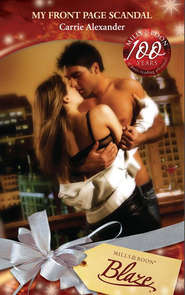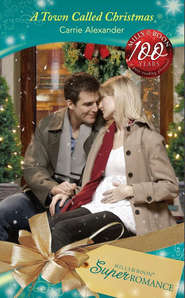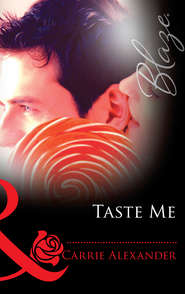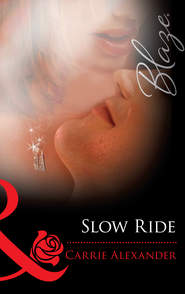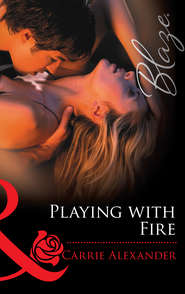По всем вопросам обращайтесь на: info@litportal.ru
(©) 2003-2025.
✖
Three Little Words
Автор
Год написания книги
2019
Настройки чтения
Размер шрифта
Высота строк
Поля
He’s the brains behind a Canadian smuggling operation, she decided. A modern-day pirate. Hence the lighthouse research. He’d come to Alouette scouting for a remote drop-off point. Guns or drugs, she imagined.
Or animal smuggling. Monkeys, marmosets or exotic birds—rare blue macaws. That’s what Jack Colton had been doing in Romancing the Stone and she remembered an article in a back issue of Smithsonian about the trafficking of rare species. Except it didn’t make a lot of sense, sneaking contraband across two borders….
Abandoning Dewey decimal, Tess blindly thrust a cookbook among the Egyptians. Black-bear organs—that was it! He was smuggling contraband out of the Upper Peninsula, not in.
Her imagination took full flight. A Chinese man with an eye patch was the contact. His name was Suk Yung Foo and he’d been sent by his gangster father to an American college to better himself. Instead, he’d met this guy, a former, um, professor…who’d been on the track to full tenure until the…cheating scandal? Embezzlement of research grants?
No. The man had too much sex appeal for his downfall to be anything but nubile young coeds.
Tess shook her head. “How predictable.”
The stranger glanced back at her. “Predictable?”
“Oh.” She blinked. “Why, uh, someone’s misfiled a cookbook. Dust Off Your Bread Machine does not belong beside Nubian Artifacts.”
“You put it there.”
“Did I?” The man must have eyes in the back of his head, but then she’d heard that of crooks.
He shrugged and returned to his reading. For a long moment Tess watched, frozen, as he flipped from illustration to illustration. Then she jammed the bread book onto her cart and wheeled it fast in the opposite direction, her heels clacking on the parquet floor. She slowed when she turned at the end of the row and peered back at him, catching glimpses of him along the aisles as she moved away at a more leisurely pace.
She was being ridiculous. He was a perfectly normal man reading about lighthouses. Alouette’s Gull Rock Lighthouse, situated on the narrow, rocky peninsula that framed one side of the bay, was frequently photographed by tourists, and it had been featured in several travel books. Although the lighthouse was out of commission and not accessible to the public, it was too prominent and exposed to be the base of operations for a smuggling operation.
Even one that operated at night? Alouette rolled up the sidewalks by ten. A herd of zebras could stampede downtown and no one would know until they stepped in the evidence the next morning.
Tess shook her head. Oh, stop it. Get back to your job.
She slipped the cookbook into its proper place, made quick work of shelving the remaining books and returned to the front desk. The stranger was still seated at the study table. If he was doing any sort of serious research, he must have a photographic memory—he hadn’t made a single note.
“Is he a tourist?” whispered Beth Trudell as she moved behind the desk, one hand splayed over her protruding midsection.
“Probably.”
“He doesn’t look like a tourist.”
“No.”
“You’d best stop staring at him and go take charge of the kids. They’re waiting for their story. I can’t promise how patiently.”
With a small groan, Beth eased herself onto a stool. She was twenty-three, married for a year, and presently eight months, one week and three days pregnant, give or take a few hours. She had been Tess’s assistant in one form or another ever since Tess had started working here. That first day, Beth had been a shy adolescent with spindly arms and thick glasses. She’d read Sweet Valley books until closing time and then helped Tess sweep, straighten chairs and water plants. The next day, Tess had introduced the girl to Little Women, Anne of Green Gables and Nancy Drew and asked if she wanted to help out with the new children’s summer-reading program.
“You finished the craft project?” Tess asked idly. Delaying. She really wanted to know what the stranger was up to. Besides, the noise from the adjacent children’s reading room hadn’t escalated to the danger zone yet.
“Six Popsicle-stick planters, all set for repotting the nasturtiums.”
“Only six?”
Beth settled herself more comfortably, wincing a little as she propped her feet on the rungs. “Grady Kujanen smashed his. He did it deliberately, so I didn’t let him make another. We were out of sticks, anyway. Then he sat beneath the table and stared at my belly while he pouted.” Beth chuckled. “Get this. He asked me when I was going to pop.”
“Pop? Where in the world…?”
“I guess he heard it from his dad. Now the children think I’m a champagne bottle. Grady told them that when I go to the hospital the doctor pulls the cork, and voilà—a baby.”
“If only it were that easy,” Tess said.
Beth patted the baby in her belly. She called it Bump. “Yeah.”
“Five more weeks, sweetie.” Beth’s due date had been circled in red on the library calendar ever since they’d administered a drugstore pregnancy test in the ladies’ room one slow Thursday night. Neither having much experience with babies, they’d used every research tool at their disposal to compile a fact sheet for the next nine months. The first fact they’d learned was that “nine months” was a misnomer. Gestation was actually forty weeks. The extra days were making Beth a little crazy.
“Randy refuses to talk in term of weeks, ever since I had that meltdown at the thought of still being pregnant in July. From now on, he says, it’s one day at a time.” Beth wiped her forehead with the back of one wrist. “One hot, sweaty day at a time.”
It was barely eighty outside, but Tess cranked up the fan that whirred from a shelf behind the checkout desk. They didn’t have air-conditioning—no budget. “You look done in, Beth. Why don’t you leave early?”
“Thanks. I’ll take you up on that. But not till the kids are gone. You know how hectic it gets when they’re all checking out at once.” Beth swiveled to face the library proper, which had been fashioned from the ground-floor rooms of a big Victorian house on Timber Avenue, one block from the elementary school and two blocks from downtown bayside Alouette. “And we have our other patrons to keep an eye on,” she added significantly. Her arched eyebrows disappeared behind curly, slightly damp bangs.
Tess shot Mr. Tall, Dark and Mysterious another glance. He was absorbed in his book, but she would have sworn his ears were pricked. Why a conversation about due dates and craft projects would concern a rogue pirate, she had no idea.
A shriek came from the children’s area. Through the open doorway, Tess saw Grady Kujanen raising a picture book over his head. “Take over for me,” she told Beth before hurrying away.
Beth’s eyes slitted as she whispered out of the side of her mouth, “Synchronize your watch. We’ll reconvene in fifteen minutes.”
Tess nodded, although Bump ruined the spy effect Beth was going for. Maybe if she’d been wearing a gabardine suit and a bow tie…
In the children’s room, Tess stepped into the fray and snatched the book out of Grady’s hands before he could bring it down on Sierra Caldwell’s head. The children knew she demanded best behavior, so after she’d admonished Grady they settled down without much complaint, gathering on the bright pillows and beanbags strewn across the carpet of the storytelling nook.
Normally, Tess would have pulled the filmy blue star-sprinkled curtains she’d hung at this end of the room to give the nook a cozy feel, but today she wanted a clear view to the main room of the library. You never knew when a baby might decide to “pop” early, so it paid to be vigilant.
Of course, it didn’t hurt that she could also see the study tables from her position on the storytelling throne, a tufted purple-velvet ottoman trimmed in bobbled fringe. The stranger had set aside the last of his picture books and was paging through a paperback by a local author, Lighthouses of Upper Michigan. Hmm…
Soon Tess had forgotten the suspicious unshaved ex-professor bear-organs smuggler and was absorbed by the story she read to the children, The Princess Who Wished Tomorrow Would Never Come. The group was a good one despite Grady’s tendency to make himself the center of attention. When he’d first started in the reading program that Tess ran three times a week all summer long, his behavior had been much worse—loud, bratty and completely disinterested in books, despite a year of kindergarten. Tess had spoken with his teachers to determine the best course of action, and so far, her subtle efforts to engage the boy’s imagination were working. He’d begun to understand the magic of reading, even though his mother considered the library little more than a convenient baby-sitting service and wasn’t too happy about lugging Grady’s books home with them.
Tess started each session with basic reading-comprehension work, then gave way to Beth for a fun arts and crafts project or mini-outdoor field trip—one day the children started nasturtium seeds, another day they chased butterflies in the library’s flower garden. It gratified Tess that they considered the storybook she read to them at the end of the hour the best treat of all. There were so many good children’s books to choose from, and she always got into the performance, using character voices and facial expressions with a theatrical flair that surprised even herself. Before she’d been dragged into performing with the local theater group a few years back, she hadn’t thought she was the dramatic type.
Not that a little bit of small-town stage experience had changed anything. She was still only Tess Bucek, a librarian with a private life as unremarkable and familiar as a bowl of oatmeal.
“‘The green-winged whippersnapper soared from the sky with a rose in its beak,’” Tess read. She turned the page. “‘Princess Ella Umbrella Pumpkinella Fantabuzella—’” the children singsonged the name with her “‘—took the rose and said…’” Tess pointed at Grady.
The chubby boy went on hands and knees to see the open book she held out. His lower lip stuck out with determination. After a few seconds, he read, “‘Zip-per-zap.’”
“Zipperzap!” Tess agreed. She allowed Grady to select a children’s tattoo from a nearby basket. She always kept a stash of modest prizes like stickers and cartoon-character pencil erasers handy.
“Zipperzap,” sighed Lucy Grant, a shy, delicate five-year-old with translucent skin. Her huge blue eyes shone with pleasure.
“‘Once the magic word was spoken and the rose petals had been flung to the northerly wind,’” Tess went on, finishing up the story with a triumphant flourish, “‘the sun came out from the dark clouds, the flowers blossomed and the creatures of the forest rose from their hundred-years’ sleep.’” She looked up and saw the dark-haired stranger hovering in the doorway, listening to her with an intent expression. “‘Princess Ella Umbrella Pumpkinella, uh, Fantas—’” No, not fantasy.
“Fan-ta-bu-zel-la,” the children recited in unison.
Tess had lost track entirely.






